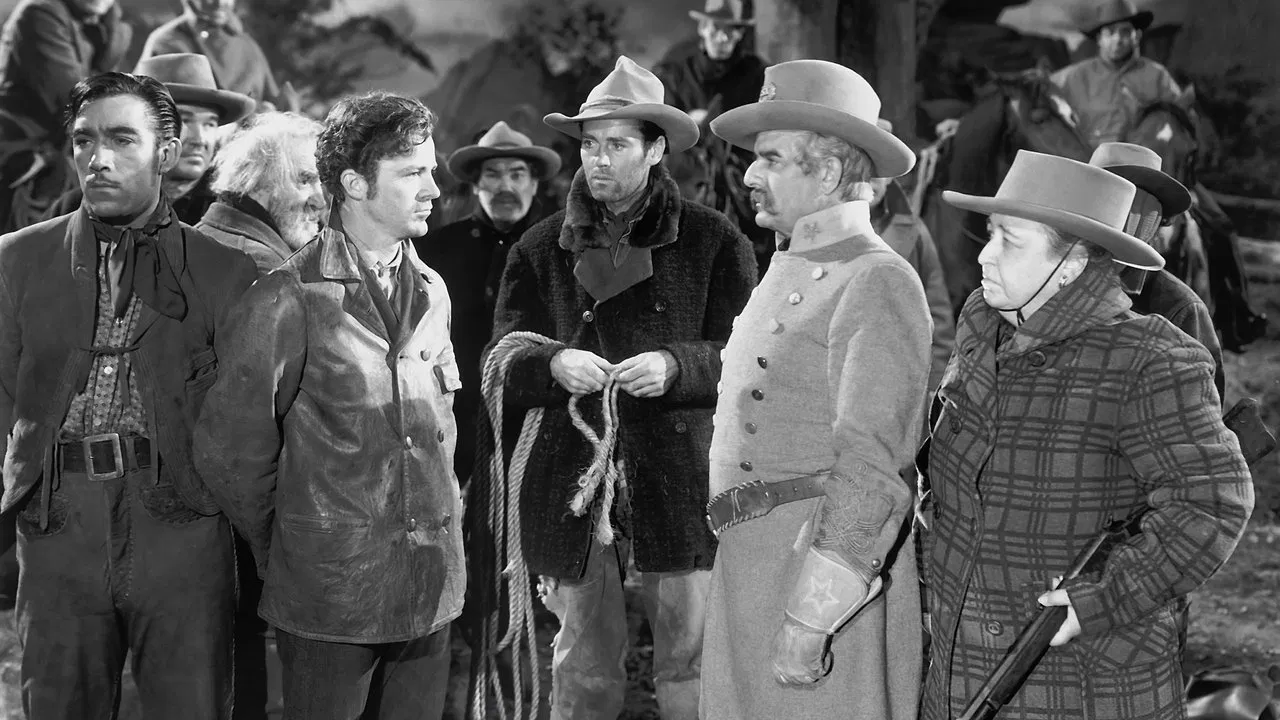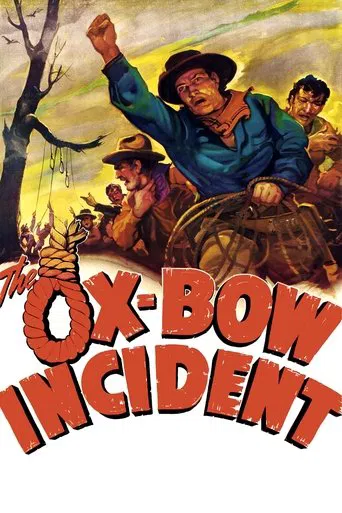

This movie isn't really remotely similar to Rashomon, but it reminded me of it because it's the type of movie that really makes you think. The Ox-Bow Incident is a classic western about a lynch mob out for revenge for the murder of a local farmer. The murder isn't shown, and the deceased is never seen onscreen, but the characters in the film feel so passionately about their fallen comrade, they immediately form a posse. A couple of men, namely Henry Fonda, Harry Morgan, and Harry Davenport, are opposed to the movement, but even though they make their case that the townspeople should wait for the deputy to return-he's out at the moment-no one listens to them. But, since Henry Fonda gets first billing, he doesn't wait around while the angry mob tracks down the killers; he and the Harrys go with them to try and talk them out of it.While he'd have to wait another ten years before winning his first Oscar, this movie marked a turning point in Anthony Quinn's career. In the early forties, he was relegated to playing "ethnic parts", but in The Ox-Bow Incident, his character is written to be intelligent and cultured-as well as ethnic. Audiences took notice of him, and in the next couple of years he started getting bigger roles. However, it's Dana Andrews who really shines. The angry mob catches three men, Tony, Dana, and Francis Ford. Dana, a family man and the main spokesman of the three, maintains his innocence and gives a performance not many men would feel comfortable giving in 1943. He weeps and begs and shows enormous vulnerability; perhaps this movie was as much his audition for The Best Years of Our Lives as it was Henry Fonda's audition for 12 Angry Men.If you like movies that make you talk about it afterwards, like Town Without Pity or The Outrage, check out The Ox-Bow Incident. It's a pretty famous classic, but it's also very heavy. You might want to put the kids to bed before you press play.Kiddy Warning: Obviously, you have control over your own children. However, due to adult material and violence, I wouldn't let my kids watch it.
... View MoreLynching - a peculiarly American phenomenon of mob violence. No less than 231 such acts were recorded in 1892. Even in 1943 three lynchings were reported) - had been dealt with in other films, most notably Fritz Lang's Fury (1936) and Mervyn LeRoy's They Won't Forget (1937). And it has been the theme of some notable films since, including Sound of Fury, Storm Warning, Riding Shotgun, Silver Lode and Intruder in the Dust. But none of these similar pictures take the uniquely objectivist view of The Ox-Bow Incident. It is a film with many villains, some familiar (the mischief-stirring town drunk, for instance, but played here with such powerful malevolence by Paul Hurst as to seem horribly original), some quite extraordinary by the prissy standards of 1942 Hollywood (particularly the loud-mouthed, lewd sadist given such vitality by Jane Darwell, of all people), ranged against twelve heroes - twelve good men and true.But examine these twelve men more closely. Three of them are the victims, powerless in their own defense: A feeble-minded, fearful old man (Francis Ford in one of his most convincing roles); a cocky but philosophically resigned Mexican (Anthony Quinn); and most importantly, an eloquently idealistic but extraordinarily stupid and impractical greenhorn living in a cloud-cuckoo land of mind-boggling naivety. It is one of the film's faults that neither as written nor played is this character sympathetic or believable. He is too stupid for credibility. We assume that it is all an act, that he will turn out to be the cunning bushwacker the villains suppose him to be. No doubt this is intentional - the director seizes upon the actor's immaturity and weaknesses to fill out the character - but it doesn't work, because we feel so little sympathy for him.Point one for curious objectivity. Point two is the fact that two of the good guys are away and arrive too late on the scene to prevent the tragedy. That makes The Ox-Bow Incident really unique.Point three are the seven men left: A well-intentioned but patronized Negro (played with a simple if "yes, massah" dignity by Leigh Whipper); a reluctant-to-be-involved cowhand (Fonda) and his even less willing buddy (Morgan); a weak, impotently defiant mother's boy (Eythe); two characters so minor they don't matter; and finally, a garrulous, whining old man (cleverly pitched by Harry Davenport to antagonize or irritate any audience).This indeed is a remarkable assembly of uniquely unsympathetic characters. But there are more: A heroine (Mary Beth Hughes) who has reneged on her promise to marry the cowhand and has instead hitched herself to a sneering, supercilious San Franciscan (Meeker); a pompous windbag of a judge (Briggs); his frosty housekeeper (Margaret Hamilton).We could go on. Remember these are the "good" people. We have scarcely mentioned the other side, led by Frank Conroy's fanatic old Confederate, and including Paul E. Burns in a rare, unsympathetic role as a rope-wielding lyncher and impressively-visaged Rondo Hatton who has no dialogue but can be glimpsed at the back of several scenes.Yes, The Ox-Bow Incident is unique. An uncompromisingly dark film with no conventional heroes or romance. Yet, despite its defiance of all the conventions, its powerful message succeeds in coming across.This success of course is no accident, but is the result of a tight unified script being convincingly played, set and directed, being atmospherically photographed and scored. True, Ox-Bow is no towering masterpiece of filmcraft - the film's limited budget has seen to that: The few actual location exteriors (including a memorable image of the hard-riding posse with Sparks trailing behind and gradually becoming enveloped in their dust) make an unwelcome contrast with obvious studio sets. The direction is inclined to be too stylish with the characters arranged in toe-the-line tableaux (an impression reinforced whenever Frank Conroy is on-screen, he stands so stiffly. Admittedly, this is certainly in character). However, these are minor defects, which do little or nothing to detract from the overall somber mood. Even the comedy is sad. And Mockridge's score with its plaintive "Red River Valley" played by a lonely concertina over the paralleled opening and closing shots is a memorable finishing touch.A courageous film, a unique film, a powerfully engrossing film, a film years ahead of its time, a film with a soberingly realistic atmosphere. The Ox-Bow is the real West. Even a much-touted realistic film like Cowboy (1958) is glossily romanticized. You'd have to go back to the silent days for similarly realistic atmosphere - particularly to Hell's Hinges (1919) directed by and starring William S. Hart.
... View MoreIt's 1885 and drifters Henry Fonda (Gil) and Harry Morgan (Art) ride into a backwater town where they learn that a popular cattleman has been shot dead and had his cattle stolen. The townsfolk are keen on a quick lynching for whoever is responsible and Fonda and Morgan go along with the posse to detract suspicion from themselves. They don't approve of what is happening along with a few others but they are in the minority. This town wants vengeance. Unfortunately, for whoever they find, vengeance is not the same as justice.Once it gets going, the film is pretty tense as you side against the majority mob led by ex-Army Major Frank Conroy (Major Tetley) and local cowboy Marc Lawrence (Jeff). The audience can sense what the outcome will be but can't quite believe that the film will see it through. I kept expecting that turning point to come and change the course of events. What happened was quite shocking.The cast are all good and the film has a compact running time and effective setting, especially that tree. I don't know how you get a tree like that. My wife reckons that it was struck by lightning. Could be? The film has a bleak ending but I guess we all make mistakes in life. We just have to move on.
... View MoreWe expect something when Henry Fonda, darling of Hollywood, strides into a bar in the west, weary, weathered but eyes alert and focused. A fight, or an argument, or a shootout perhaps. And we also expect him to win it, because, well, he's Henry Fonda. His Gil Carter is not as intimidating as say, his Wyatt Earp, but nevertheless he still has the presence of the leading man, the protagonist, the one who will shake up the small town and its inhabitants. But here is a film that goes against that narrative - he is not the invincible figure who can overcome all odds, and for once the strange powers of mob justice overwhelm everything else. Gil and his companion Art in fact join the posse because they are new in town and drawing lurking, suspicious glances from the folk - what better way to draw attention away from themselves than to take part in their own sport? The film portrays that dangerous allure that can drive mobs to do things that individuals could never even think of doing. Innocents and the naive are dragged along with them, or else for fear of not fitting in, being cast aside, being viewed as weak - as the mayor's son sees himself as. But they don't go about it chaotically. The scariest thing is that it evolves in a way that seems also consequential. The sheriff is missing, so the deputy steps up, and swears to uphold the mob's democratic 'justice'. When they catch their suspects, all the evidence seems to point to them, and the only witness who can prove their story is conveniently dead. At a mere 75 minutes it does not ever drag to that eventual conclusion (with the exception of a rather tame encounter with an ex- girlfriend of Gil's). Slowly, Trotti takes away our hope of the group ever getting a fair trial and justice. Dana Andrews' Donald Martin sells this increasing desperation. It is clear from the very foremost discovery that he is not a murderer or a thief - but no matter how well spoken and passionate he is the mob is not swayed. Indeed, as his most eloquent words are heard he is already dead, but his character shines through. As Fonda gives a stirring rendition of the misplaced morals and justice that has lead to his untimely death, Wellman pans across the bar to all the regretful participants. These events will not leave their eyes for a long time. Funny too, when movie goers don't expect a coward, but then are made to desperately want all these men to be so.
... View More